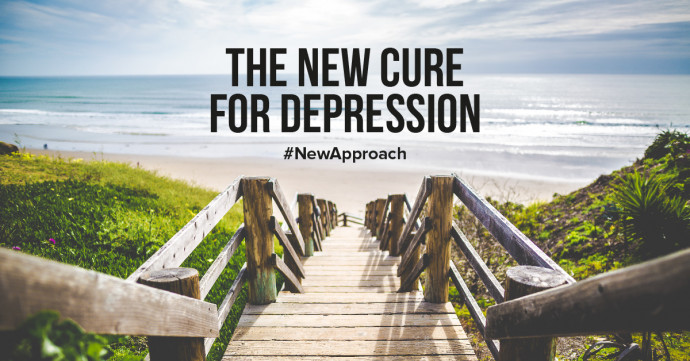The new cure for depression could be easier than it seems
People suffering from depression don't have an easy life. With a bit of luck, the doctor prescribes medication to cure you. If that doesn't work, you will probably see a therapist who often after many sessions won't know what to do with you anymore.
Luckily there is someone who has been researching depression for over more than ten years, but from a completely different point of view than before. An approach that gives unique, new and enlightening insights into the cause of depression and how to cure it.

The person who did this research is Wassili Zafiris. He is an NLP Master Trainer, neuro-semantics trainer, accredited coach, and has been working independently for more than 25 years. With a few books to his name, his last book is about depression. The unusual title is: "Happiness is depressing", but when you start reading his book, you soon understand that he might be right.
Depression, the 'disease' without a cause
All doctors and therapists work with a book called DSM. This stands for 'Diagnosis and Statistical Manual for mental disorders'. A new edition is published once in a while, and not long ago, DSM 5 was published. In DSM 5, depression is referred to as a disease without a clear cause. According to Wassili, this is incorrect, and depression does have a cause, so there is also a cure. But not as you would expect.
Wassili says that the DSM books have created a kind of DSM thinking. In one of his videos (in English), he tells us that until recently, a doctor or therapist only had two ways to solve a disease or disorder. Namely: surgery or medication. He leaves aside the fact that you can also take a lot of rest or talk about your problems.
A new approach to depression
We now know that there is a difference between how we experience the world and what happens in reality. This has, among other things, to do with beliefs, faith, perception, and as it is called, your "state of being". If you are happy, you see the world around you more optimistic than if you are angry or sad. While the world around you is the same, your own "state of being" changes your perception of what is going on or what you see. This is what you call the difference between your "inner landscape" and your "outer landscape".
Wassili's new approach to depression finds its foundations in the "inner landscape". Over the past 12 years, he has researched and successfully treated the "inner landscape" of people with a depressive state. His first basic discovery was somewhat obvious, but perhaps also the "problem within the solution" that made it took so long for anyone to come up with a cure.

When he asked what depressed people wanted to get out of the session with him, the answer was always that they just wanted to be happy again.
We can't be happy all the time
The statement that someone just wants to be happy seems logical but is actually not logical at all, according to Wassili. It implies that you can be happy all the time. As if feeling unhappy is not part of life. Every state of being is temporary.
For example, euphoria, sadness, self-satisfaction, or anger is never a permanent state of being. It is there for a while and is exchanged for the next state of being. Someone who strives for the continuous state of being happy pursues something that does not exist. Life is not designed for that, you might say.
According to Wassili, the pursuit of a continuous state of contentment and happiness is a trigger for depression. That in itself is a remarkable finding and an opening towards a solution for depression. Hence the title of his latest book: "Happiness is depressing".
Depression is a composition of symptoms
Until now, according to DSM 5, depression was a composition of symptoms. Wassili does not deny that there can be no physical cause due to the dysfunction of your body, as a result of which certain substances are not produced. On the contrary, he emphasizes that if this is not the case - which he believes to be true in most cases - then medicines are not the solution.
In fact, because it is a composition of symptoms, many therapists don't know where to start their therapy because the symptoms of people suffering from depression are so comprehensive.
Symptom treatment rarely works. So one gets medication. While if we move away from the idea that depression has no apparent cause, therapy can be developed and is now available. Wassili has proven through his results that he has developed a successful therapy.
This will most likely be improved in the coming decades' thanks to his research and by like-minded people or the successor of Wassili. Still, even now, he is already achieving extraordinary results.
The cause of depression
Wassili Zafiris' research and his personal experience of the past 12 years by working with people suffering from depression bring the following highlights. Wassili has been able to identify three causes that made people suffer from depression. They all experienced a minimum of two of these three causes.
- A feeling of loneliness
- A suddenly changing self-image
- A chronic feeling of setbacks
A feeling of loneliness
People who have a state of depression can feel lonely in two ways. This has more to do with how they experience the world than with what happens in reality, so therapy or coaching can help to bring the "inner landscape" back into balance with reality.

Loneliness despite many friends and family
Depressed people can feel lonely despite the warmth of friends and a caring, harmonious family. They are no longer able to give meaning to words such as "fun together" or "joyful together hanging out".
Loneliness because you hate the world
Depression can also be caused because, at some point in your life, you have decided not to trust anyone anymore and to hate almost everyone in the world. The world has become an insecure place where you alone - or one of the few - know how people should live and be. You develop pessimism.
A suddenly changing self-image
Our idea of our identity and self-image can change spontaneously through an event or insight. This can be due to an illness or an accident, but also due to a slumbering change that you suddenly realize.

Wassili himself uses the example of a man who has turned 50 and who takes his six-year-old daughter on his lap that day. While she was sitting lovingly on his lap, he saw himself and her in the mirror, and suddenly he saw an old man.
He always felt young, but his "inner world" was abruptly in disharmony with his "outer world". The result was a depression in the knowledge that he would never see his daughter grow very old.
The feeling of chronic setbacks
We all know the setback of ending your relationship, breaking your leg, a bicycle, or car is stolen or the feeling of your ATM card not working at the checkout. Realistic events that can take some time to get over.

Misfortune becomes chronic when you project your own "inner landscape" onto your "outer landscape". If your own truth and beliefs become your only guideline for what is happening outside of yourself, you may start to see life gloomy.
Then you want, as it were, to impose your way of life on the rest of the world. Anything that others don't do according to your own standards, values, and beliefs become a setback.
Someone is getting in front of the queue, they cut someone off on the bike or in the car, they don't eat neatly with a knife and fork and so on. That can all be experienced as misery and setbacks because people do things not according to your plan and ideas. This says nothing about what is really going on, but all the more about how you experience it through your "inner landscape".
The solution to depression
What Wassili Zafiris has been able to demonstrate is that at least two of the three causes mentioned above have led to depression in everyone he treated. So there is a cause of depression, and that's where the solution starts.
If we realize that the cause has more to do with your "inner landscape" than with what was and is going on in your "outer landscape", then there is a remedy for depression. The remedy is there, now an adjustment is needed in the DSM 5 book, but that will have to wait for the release of DSM 6.
If you want to know more, order the book written by Wassili Zafiris. "Happiness is depressing" or call directly via live video calling with Wassili Zafiris.
-
Pierre HoltzhausenFull time Life Coach€ 0,55 pm
-
Rose Marie NelsonLife Coach€ 2,09 pm
-
Wassili ZafirisCoaching, Training€ 3,33 pm
-
Anthony KollerI am a psychiatrist.€ 1,00 pm
-
Emma GovenderTutor/Life Coach€ 0,05 pm
-
Meliss AkaydnPsychology€ 0,33 pm


































